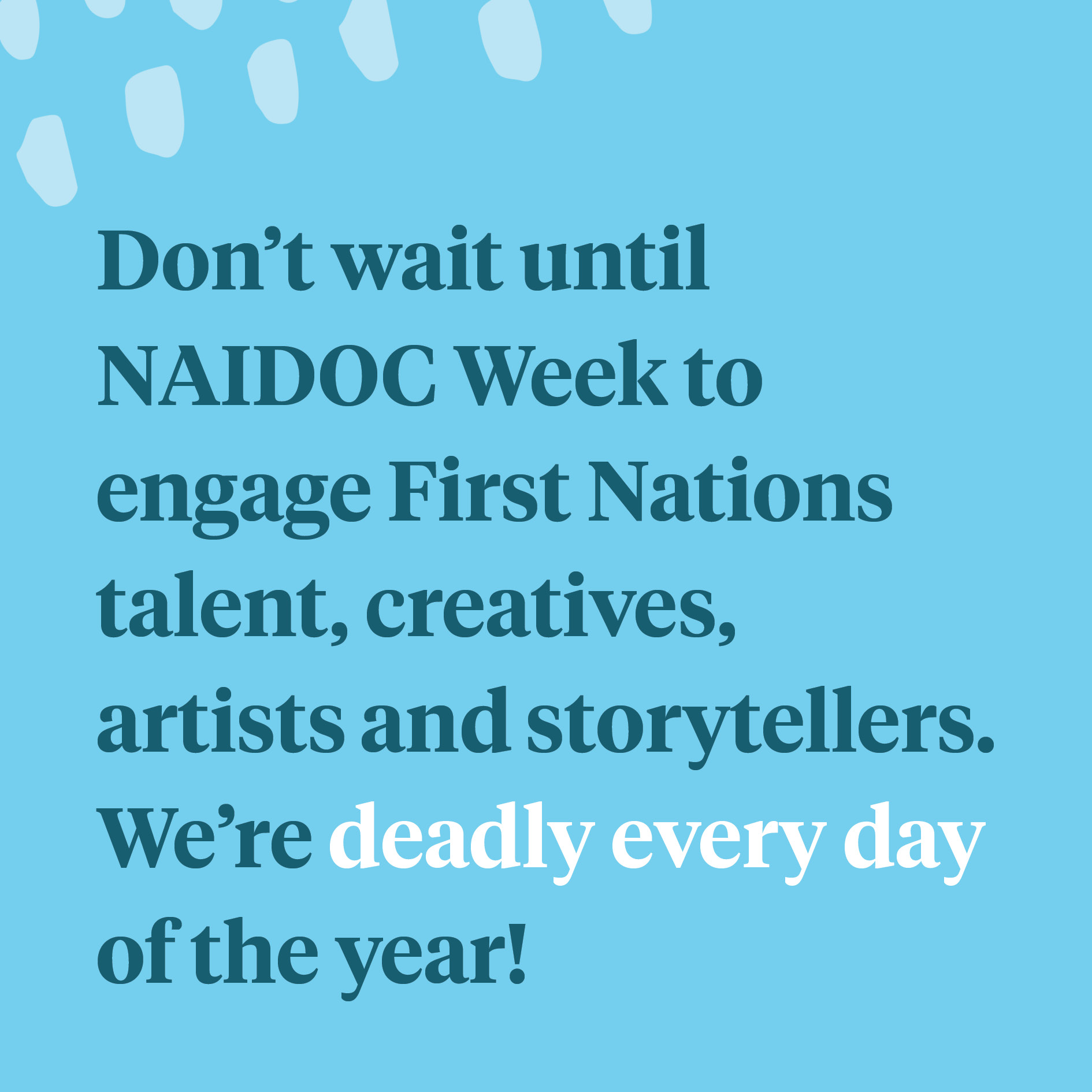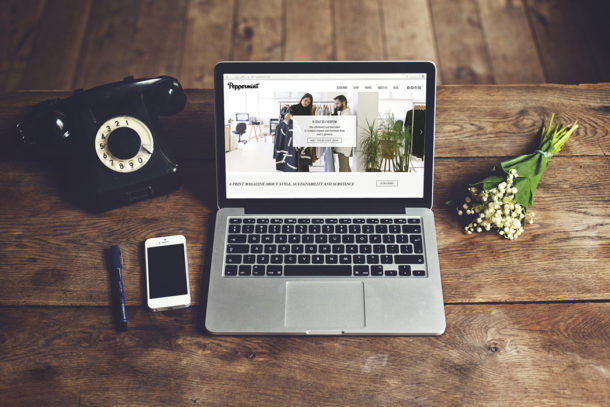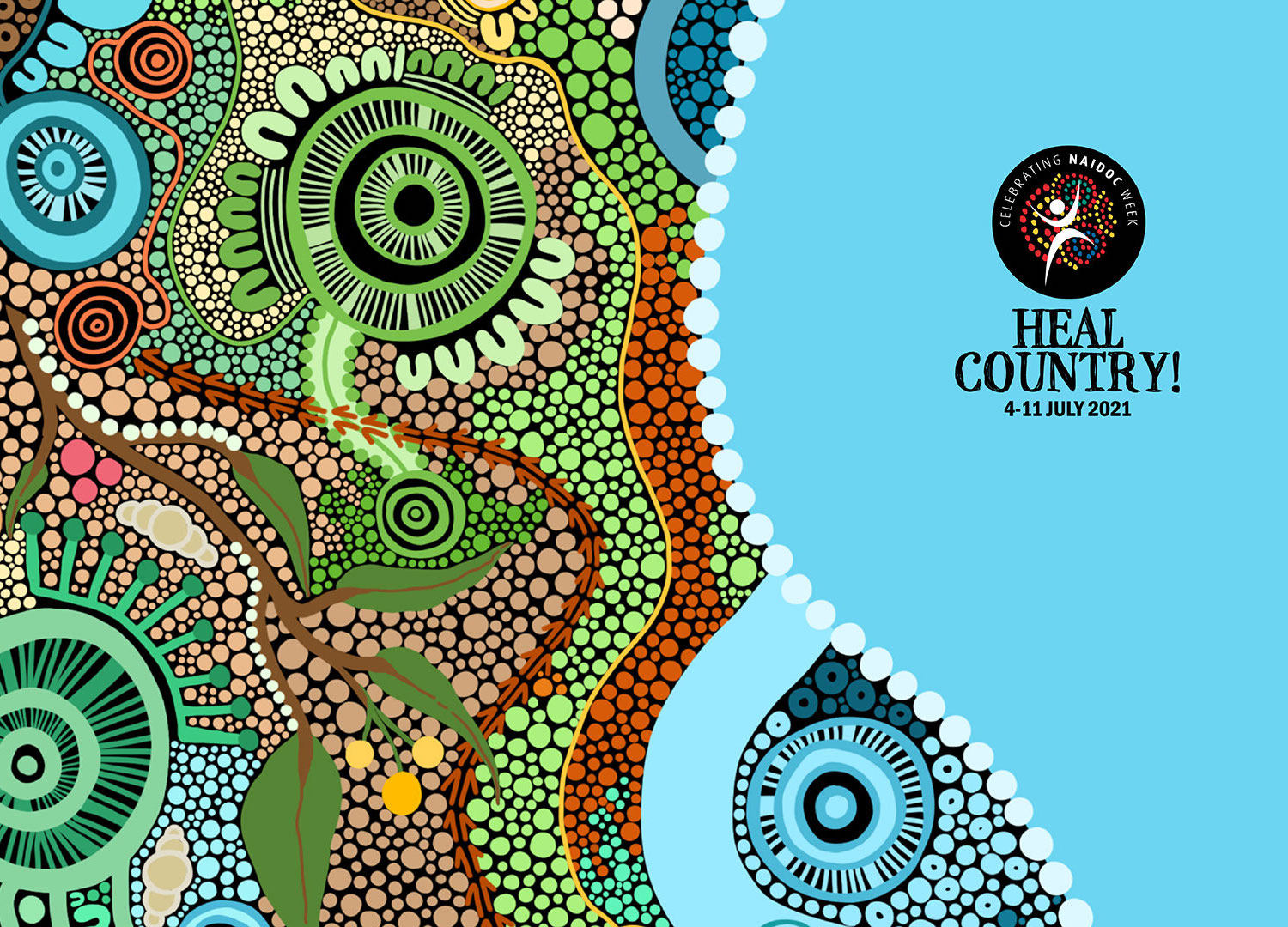
“Deadly Every Day of the Year”: Four Lessons to Reflect on This NAIDOC Week
words GEMMA POL
Each July, NAIDOC Week (4-11 July) offers an opportunity to celebrate the rich history, culture and achievements of First Nations peoples. Wiradjuri, Ngemba and Paakantji writer Gemma Pol reflects on this year’s theme and shares how we all have a responsibility to care for Country.
Wait… didn’t we *just* have NAIDOC Week? Don’t worry… your perception of time might not be as warped as you think. NAIDOC Week was held in November last year, due to COVID-19 restrictions. But this year, we’re back to our regular first-week-of-July programming. Two NAIDOC Weeks in the space of nine months instead of 12? Ay… look out.
You may be wondering what NAIDOC Week is, especially if you didn’t attend school here in so-called Australia. Way back when, NAIDOC stood for ‘National Aborigines and Islanders Day Observance Committee’, but this language is outdated so the acronym has since taken over.
NAIDOC Week is about celebrating the richness and diversity of First Nations peoples, our cultures and our stories. It’s about acknowledging Blak excellence and centering the deep knowledge we have of Country. It’s a week for everyone to celebrate, learn and grow together.
Every year, NAIDOC Week has a theme: ‘Always Was, Always Will Be’ in 2020; ‘Voice. Treaty. Truth’ in 2019; and the incredible ‘Because Of Her, We Can’ back in 2018.
After the wildfires of 2019-20 inflicted chaos on Country for months on end, the theme for 2021 couldn’t be more timely – ‘Heal Country!’ is about protecting, advocating for and strengthening all aspects of Country, including (but not limited to) our lands, our waters, our sacred sites, our cultural heritage and the sacred relationships we have to these things.
This year, NAIDOC Week is a reminder for all of us: we all have a responsibility to defend and care for Country. We all have an obligation to take meaningful action. So for allies and Mob, here are some ways we can help heal Country together – sprinkled with insights from Blak activists, thought leaders and business owners.
Develop your relationship with Country
First Nations peoples have an innate connection to and relationship with Country. This deep relationship is grounded in reciprocity – where we don’t just take, but we give. It’s about maintaining balance, so natural resources are never depleted. When we need something from Country, like a medicine plant or bush tucker, we ensure we’re adding value in other ways, like through traditional farming or cultural burning.
“Non-Indigenous people can also find a place and start to build a relationship [with Country],” says Marlikka Perdrisat, a Nyikina Warrwa and Wangkumara Barkindji activist and storyteller. “Some people may have a favourite beach, a park, a family farm… somewhere you feel at home and comfortable. When you have that relationship, duty falls on you to continue building it, and to continue developing it. Because we have to love Country and Country loves us.”
Gamilaroi man and the founder of Sobah, Clinton Schultz, agrees – longing for Country and its protection is universal, something that unites us as human beings.
“Personally, Country is part of me,” he says. “I am part of Country. If Country isn’t well, I’m not well. My overall wellbeing depends on Country being healthy too. And I don’t think this is just a First Nations thing. We as humans need to live in harmony with Country, with Mother and with place.”
Your takeaway: Build your relationship with Country. Walk on Country as if it were your friend.
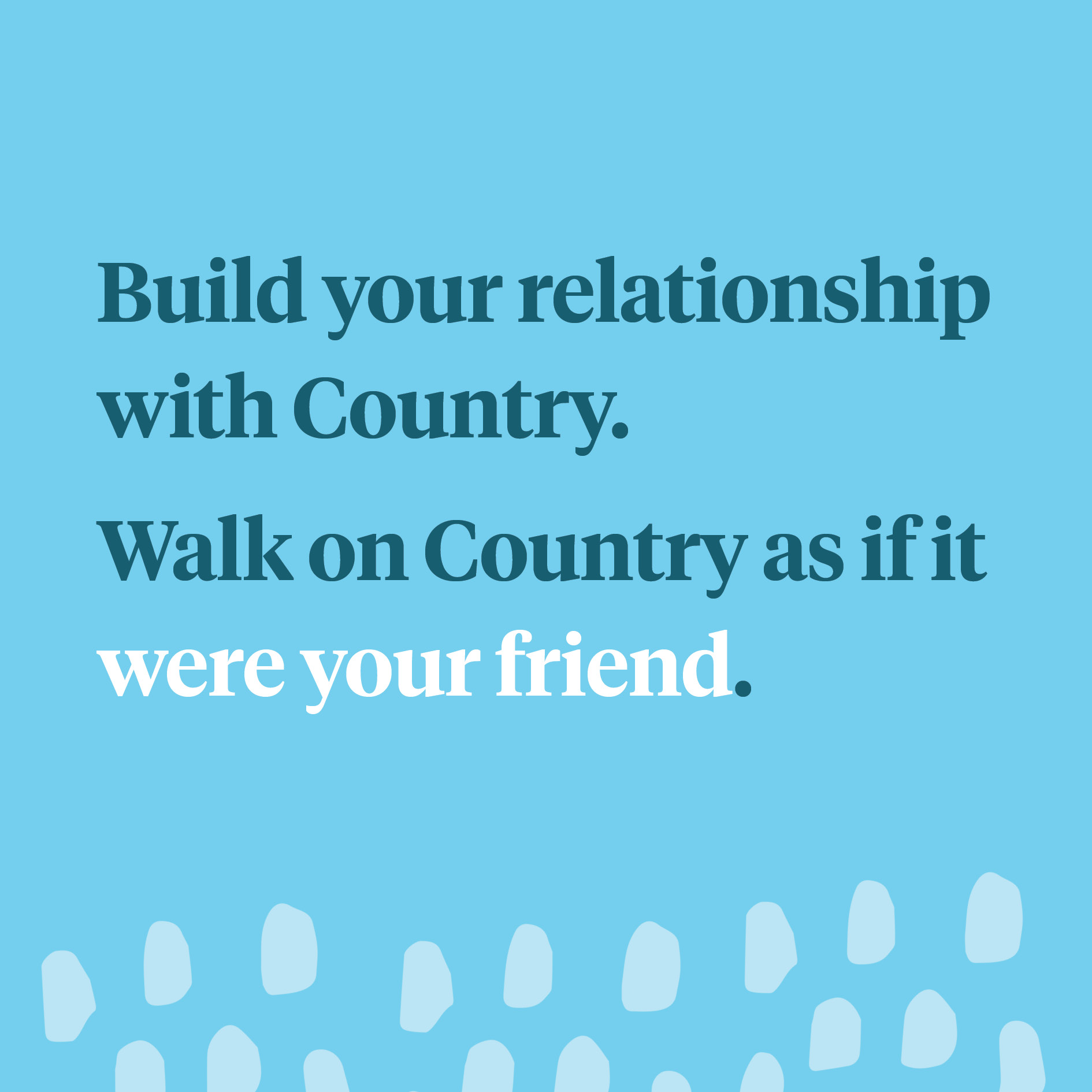
Think intergenerationally
First Nations peoples often think beyond the current time, about how our actions today will touch the next thousand generations. This way of thinking is tied to the all-encompassing complexity and boundlessness of The Dreaming. As anthropologist W.E.H. Stanner once said, “One cannot ‘fix’ The Dreaming in time: it was, and is, everywhen.”
Kaytetye woman and Common Ground’s founding CEO, Rona Glynn-McDonald, says that although this way of thinking and being isn’t easy in contemporary ‘Australia’, the outcomes are worth it. “Living within a colonial context makes this way of thinking and being challenging, but the knowledge and cultures we have grown up sharing from one generation to the next teach us to think beyond ourselves,” she shares.
Marlikka agrees: “We have a relationship with time. And it is not a straight line. It is circular. We have to use the past, in the present moment, to protect the future. To me, this is a guiding principle as an Indigenous person.”
Marlikka says it’s also about intergenerational change, a philosophy we can share with non-Indigenous people. “We all need to build hope. We all need to know change is possible.”
Your takeaway: Think about the ripple effect of your actions. Act with future generations in mind.
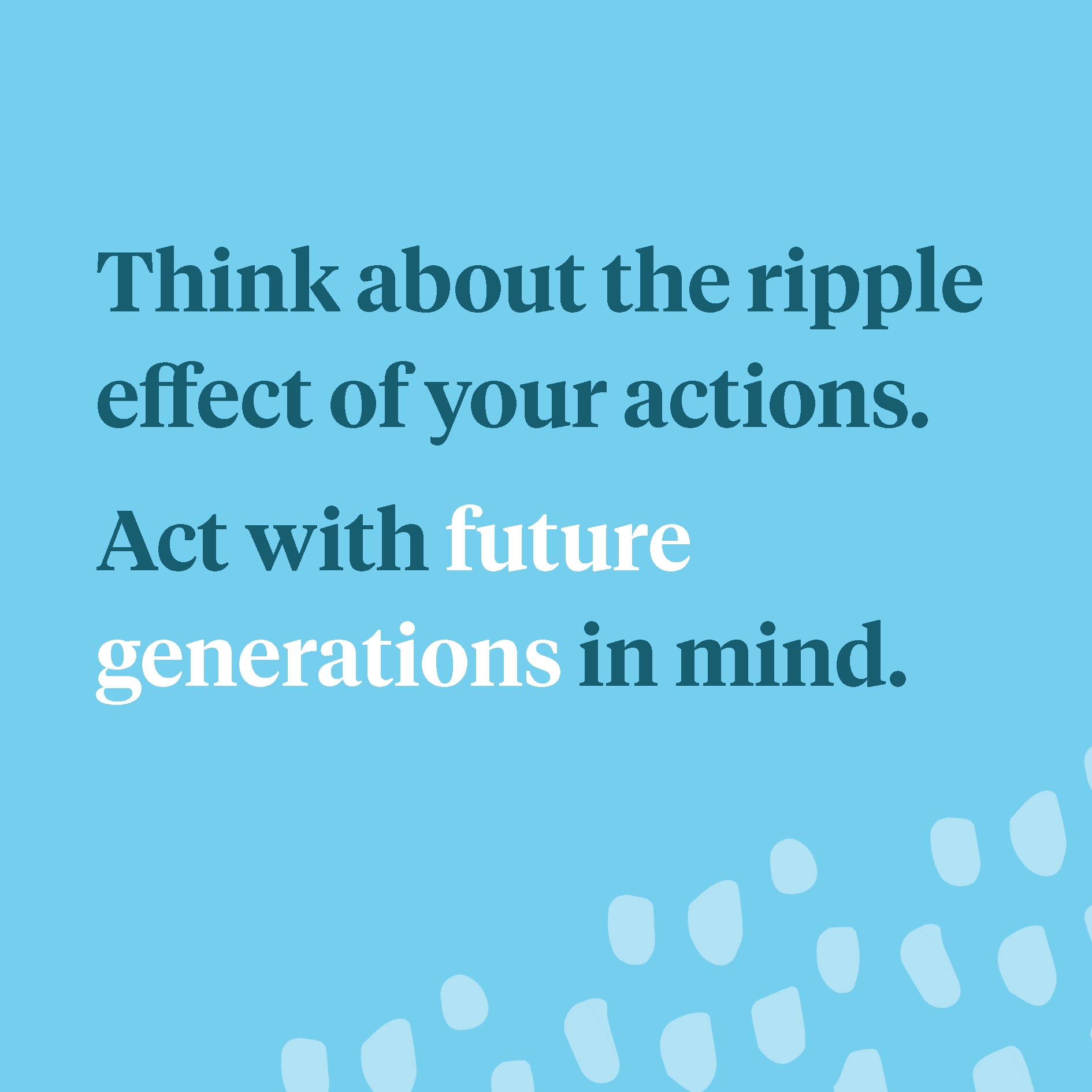
Back Blak business
First Nations peoples are strong, resilient and adaptable. So it’s no wonder that our businesses are too. While colonisation has seen us mostly excluded from the mainstream economy for the past two centuries, today we’re reclaiming our space in business. We’re using business as a vehicle for self-determination, and we’re using social enterprise to help heal Country.
Yorta Yorta and Boonwurrung woman Corina Muir, who is the founder of clothing label Amber Days, says she brings caring for Country into every step of her business. She also says that when you purchase from a Blak business, you’re supporting our autonomy and capacity to govern our own lives.
“One of the best things about being an Aboriginal woman in business, is that I get to work while not compromising my values or my culture,” she shares. “When working for someone else, I was always expected to compromise and it was exhausting. But now, being a business owner, I get to make decisions I align with, which is so empowering and healing.”
Corina explains that when you buy from a Blak business “you’re actually supporting a lot of Blak businesses and a lot of Aboriginal people. We all collaborate and support each other and often have Aboriginal suppliers. Our family benefits, our community benefits and mainstream society benefits.”
“Anybody who calls themselves an ally should be thinking how they can better use Aboriginal resources in everyday life,” Clinton adds. “They should be thinking, ‘What do we need today and how can I include Aboriginal people and business?’ When you think about Aboriginal business, we’re just as capable, if not more capable, at supplying knowledge, skills, products and resources than any other business in this country.”
Many Blak businesses have a social agenda, even if they don’t identify as a social enterprise. This is because First Nations peoples put Country and Mob first. Our business models reflect this.
Your takeaway: Each time you need to make a purchase, prioritise buying from Blak-owned businesses. Because when you buy Blak, you back Blak. And when you back Blak, you back Country.
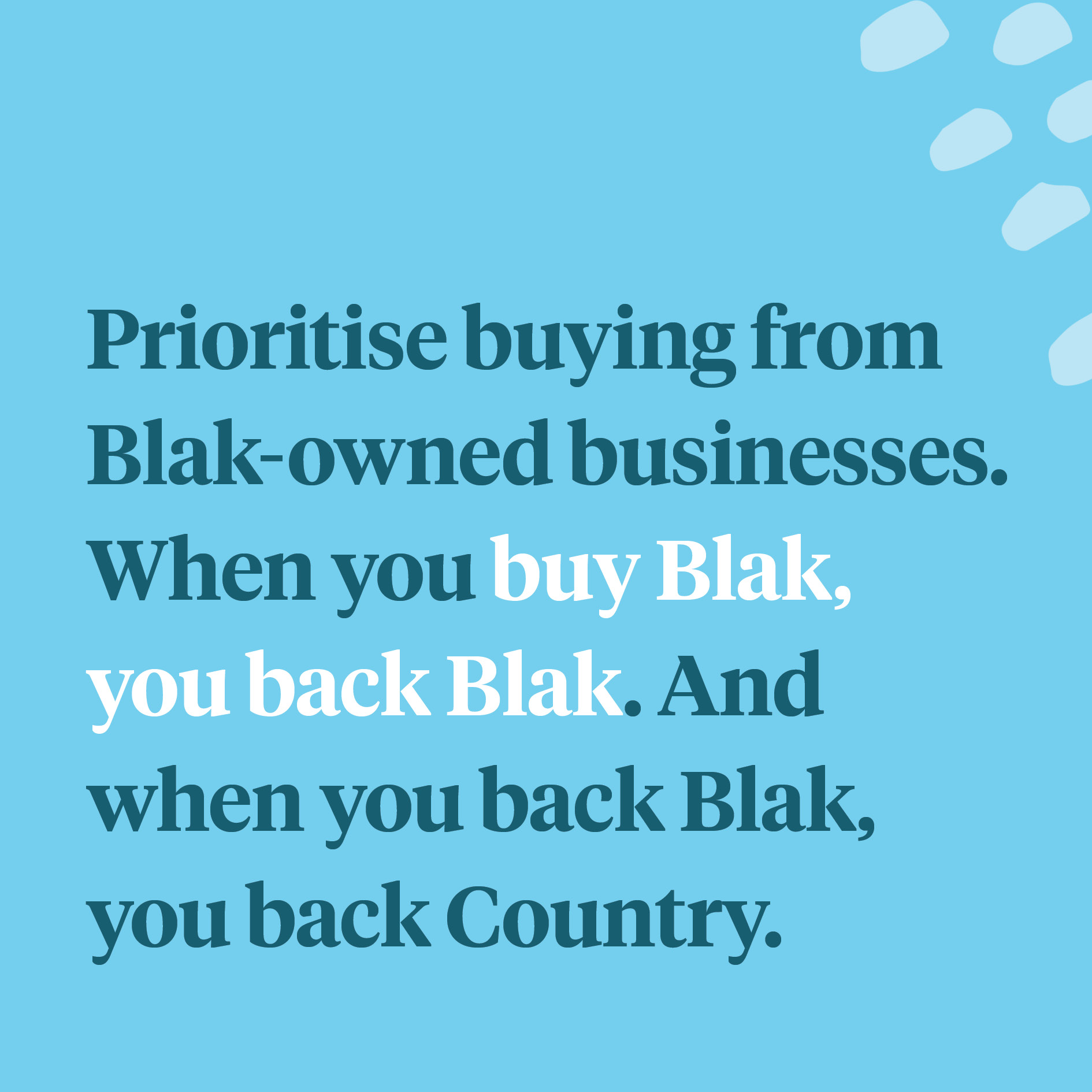
Centre First Nations knowledge beyond NAIDOC Week
Believe it or not, the deep knowledge of First Nations peoples doesn’t extinguish itself at the conclusion of NAIDOC Week. In fact it exists, evolves and flourishes outside of these calendar confines.
It’s important to hire Blak models, support Blak advocacy campaigns and ask Blak people to speak at events all year round.
“As much as I have great memories [of NAIDOC Week], it’s important to recognise that for First Nations people with any sort of profile – whether it’s through sports, academia or the arts – it’s a ridiculously busy week. We don’t often get to actually enjoy it,” Clinton says.
“It should be our time to heal but all we do is work for those who have given us only a couple of weeks of the year to be celebrated.”
Our old stories hold complex knowledge and solutions to healing Country. If everyone centred First Nations peoples and knowledge all the time, we might not be so overwhelmed during NAIDOC Week. “My best piece of advice for allies this NAIDOC Week is to start coming to us,” Clinton ends. “Be that to our businesses, our organisations, our community events. Stop expecting us to always come to you. And stop expecting us to come at your beck and call to tick your Reconciliation Action Plan boxes.”
Your takeaway: Don’t wait until NAIDOC Week to engage First Nations talent, creatives, artists and storytellers. We’re deadly every day of the year!
